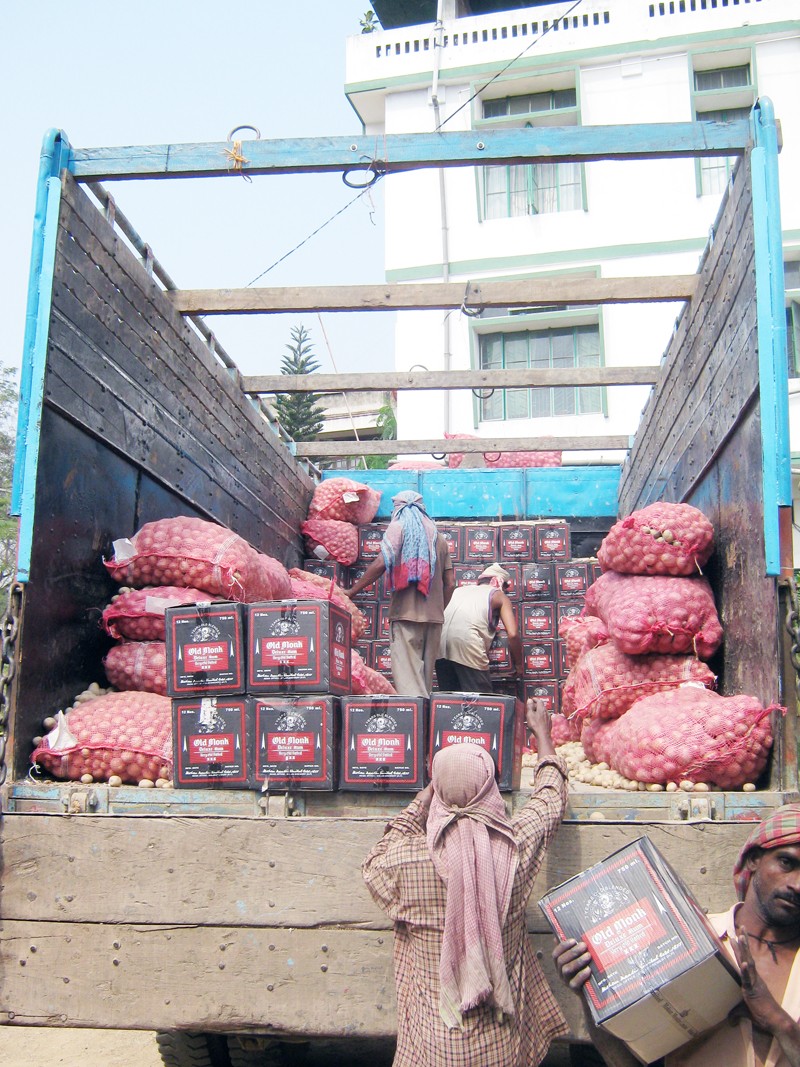CORE ISSUE: Seized illicit liquor, hidden under sacks of onion, being unloaded at a police station in Dimapur. (File photo)

Morung Express News
Dimapur | August 17
In Nagaland, most of the drinking goes on surreptitiously — in dark alleys, inside cars, in all kinds of shady places. In fact, a visit to any booze joint in Dimapur or elsewhere will have one find near it, a private shop selling packaged drinking water, soft drinks and potato chips. If you stick around the area for a while you will gather what is happening: ordinary people buying a ‘quarter’ of a bottle of rum or whiskey and heading for the nearest dark corner.
Prohibition of alcohol in Nagaland is perhaps one of most famous — or infamous — phases ever. The ‘dry days’ which began in 1989 was intended to reduce the consumption of alcohol and eliminate businesses that distribute and sell alcohol. Instead, since prohibition was imposed, bootleggers and smugglers in Nagaland have become some of the wealthiest people. Despite the ban, all liquor brands are available in Nagaland, and at exorbitant prices at that. Yet, except for the church and some civil organisations, prohibition of liquor is considered by many a failed social experiment. “Everybody knows what is happening…who are we fooling?” a shopkeeper reminded. He has been in the business for more than six years.
There is nothing to suggest that the place is a ‘shop.’ He sits on a stool behind the counter with packaged water bottles neatly stacked in an overhead cabinet. The walls are adorned with pictures of Hindu goddesses.
Unlike licensed liquor shops, such ‘shops’ are open 24 hours. His daily income is by no means less than a government officer’s monthly paycheck. He adds “Old people, young people, girls and boys…everyone comes here to buy.”
While the Church has been expounding on the principals and ethics of Christianity, the irony is that the country that brought Nagas to Christ is flowing with liquor. In The Morung Express poll carried out this year, this era of prohibition has been associated with crime, bootlegging and repercussions which has upset social network of Naga society.
Many people are opposed to the notion that prohibition has led to increase in crime rate. “Millions of people drink alcohol every day but they do not find the need to murder, steal, rape…” a habitual drinker asked. He added why those opposed to lifting prohibition aren’t talking about bootlegging, liquor barons and under-age drinking.
Many people have also realized that the control exerted by church instituions cannot always take the place of personal responsibility. Lately, a number of lounges and restaurants have come in Dimapur. And nobody can pretend they don’t know what is being served. Most sources confirmed they have seen under-aged children drinking in the lounges. “Since there is prohibition, no lounge in the city (whether they serve liquor or not) asks for identification,” some said. They added that the guideline for serving liquor as per the age policy carries no meaning as Nagaland is a dry state. “There is a wide spectrum of issues related with prohibition…I think people must also recognize the problems, as well as benefits of alcohol,” a source said.
Most people who oppose prohibition feel that is the Church and other civil organisations are determined on letting prohibition stay; they have to get to the heart of the matter. The general opinion is that these organisations can act as a watch dog but is not the government. Interestingly, a supporter of prohibition adds “I personally would like prohibition to stay…provided it is successful; which is not happening.” Prohibition has led to a syndicate of liquor barons in Nagaland. Police vehicles, government and VIP vehicles have been seized with IMFL on several occasions.
An Army officer also remarked “I have observed that Nagas drink like there is no tomorrow… simply for the fact that it is in their psyche they may or may not get it tomorrow.” He said that Nagas drink with ‘guilt’ when it could have simply been a conscious decision.
(This story was written after talking to a number of sources who are opposed or in support of prohibition)






